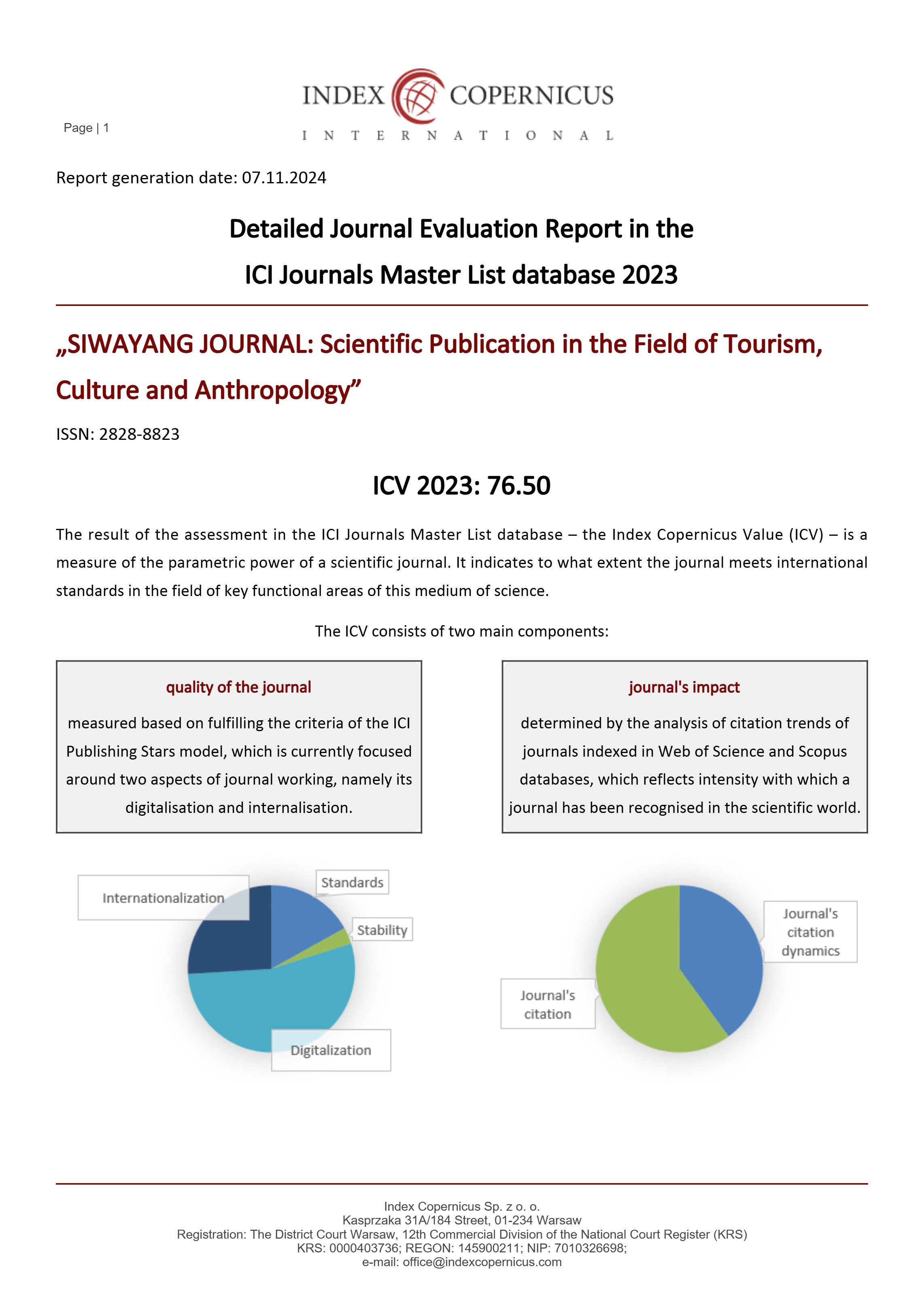MEMPERKUAT EKONOMI MASYARAKAT MELALUI EKSISTENSI PARIWISATA ISLAM DI INDONESIA
DOI:
https://doi.org/10.54443/siwayang.v3i2.1567Keywords:
Tourism, Islam, Economy, IndonesiaAbstract
Indonesia is characterized by its rich multicultural diversity, showcasing a myriad of tribes, cultures, religions, and breathtaking natural beauty that are ripe for exploration. The increasing public interest in leading a healthy and spiritually enriching lifestyle has elevated the role of halal tourism as a prominent industry. Islamic tourism, which adheres to sharia principles, not only offers engaging experiences for visitors but also significantly contributes to the economic empowerment of local communities. The sectors involved in halal tourism, such as hospitality, culinary, and local crafts, see a direct benefit from this growing market. This article explores the positive impacts that Islamic tourism has on enhancing local employment opportunities, boosting small businesses, and fostering cultural exchange. Furthermore, it addresses the challenges faced in promoting halal tourism, including the need for proper infrastructure, awareness among the local population about halal standards, and effective marketing strategies. By understanding these dynamics, stakeholders can work together to advance Islamic tourism in Indonesia, ensuring its sustainability and positive impact on the socio-economic landscape.
Downloads
References
Adinugraha, H. H., Sartika, M., & Kadarningsih, A. (2018). Desa wisata halal: konsep dan implementasinya di Indonesia. Human Falah, 5(1), 28-48.
Amankwah, A. O., & Amuquandoh, F. E. (2018). Exploring the Sustainable Development Goals in Tourism: Perspectives of Tourism and Hospitality Stakeholders. Tourism Management Perspectives, 27, 1-8.
Bone, D. P. (2019). Jenis jenis tempat wisata berdasarkan motif wisatawan, lokasi tujuan, dan perjalanan. Diambil dari Dispar.bone.go.id
Bustamam, S. S. (2021). Potensi Pengembangan Pariwisata Halal dan Dampaknya Terhadap Pembangunan Ekonomi Riau. Jurnal Ekonomi KIAT, 146-161.
Efendi, R. (2020). Sustainable Tourism Development: Seminars and Practices in Indonesia. Journal of Tourism Studies, 12(1), 45-59.
Halteh, T. (2019). The Role of Social Media in Promoting Halal Tourism: A Study on Indonesian Context. International Journal of Islamic Marketing and Branding, 5(2), 137-149.
Hakim, L. (2022). Pariwisata Islam. Sleman: CV BUDI UTAMA.
Herlambang, H. (2016). Dampak Pariwisata Terhadap Perekonomian Masyarakat. Jurnal Pariwisata Indonesia, 1(2), 35-45.
Indah, R. (2018). Strategi Pengembangan Pariwisata Halal di Indonesia: Tinjauan dari Perspektif Pemangku Kepentingan. Jurnal Ilmu Pariwisata, 5(1), 12-25.
Jaelani, A. (2020). Pengembangan Pariwisata Islam di Indonesia: Peluang dan Tantangan. Jurnal Manajemen dan Pariwisata, 20(1), 78-90.
Karim, S. (2013). Pembangunan Pariwisata dalam Perspektif Islam. Jurnal Tajdid, 16(1), 117-126.
Lukmanul Hakim, S. T. (2022). Pariwisata Islam. Deepublish.
Nurdin, I., & Suparman, A. (2018). Analisis Potensi Wisata Halal di Indonesia. Jurnal Sosiologi dan Pariwisata, 4(2), 217-230.
Rahman, A. (2020). Persepsi Masyarakat Terhadap Pariwisata Halal di Daerah Wisata. Jurnal Kemanusiaan, 10(3), 134-147.
Rahman, G., & Nasir, M. (2021). Dinamika Pariwisata Halal di Indonesia: Tinjauan Kebijakan dan Perkembangan Pasar. Koordinator Pariwisata, 14(4), 221-240.
Setiawan, A. (2018). Peranan Pariwisata Muslim dalam Pembangunan Ekonomi Berkelanjutan. Jurnal Ekonomi dan Bisnis Islam, 9(3), 58-75.
Subhan, M., & Utami, S. S. (2021). Tantangan Pengembangan Pariwisata Halal di Indonesia. Jurnal Pariwisata dan Kebudayaan, 2(1), 28-37.
Timothy, D. J. (2007). The Economics of Tourism: Principles and Practices. Tourism Management, 28(1), 1-40.
Utama, I., & Rai, G. B. (2011). Pariwisata Menurut Pandangan Islam dan Muslim. Jurnal Ilmiah, 4(1), 12-21.
Wahab, Salah dkk. (1997). Pemasaran Pariwisata. PT. Pradnya Paramita. Jakarta.
Downloads
Published
How to Cite
Issue
Section
License
Copyright (c) 2024 Muhamad Zuhud

This work is licensed under a Creative Commons Attribution-NonCommercial 4.0 International License.











